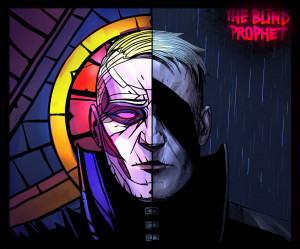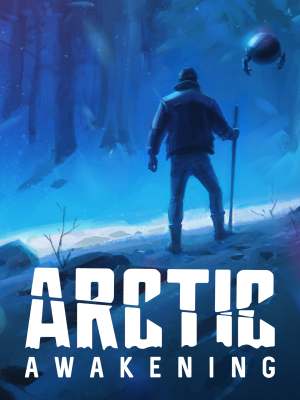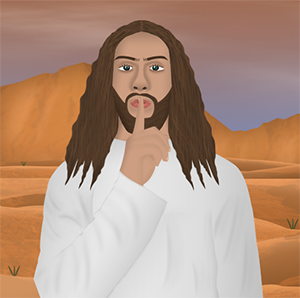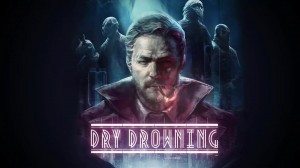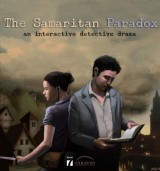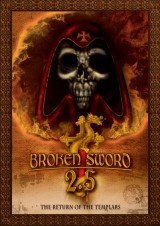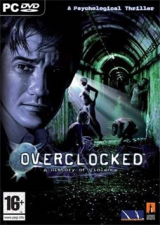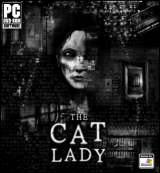Review for The Blind Prophet
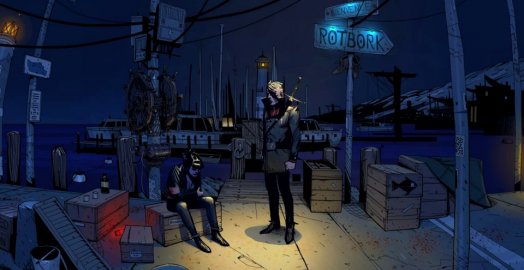
The primary purpose of a religious text isn’t to tell a story but to impart a message to the faithful, meaning that large portions of the central figures' lives often go unrecorded. It's left to mortals to speculate about many of the details, oftentimes through folk stories and legends. As a faith endures across the millennia, so too does the tradition of using storytelling to fill in the gaps. Case in point: the Biblical “Acts of the Apostles” never says in so many words that Christ's twelve disciples went on to form an elite fighting force of sword-wielding demon slayers after ascending to Heaven—but it doesn't actually get around to saying they didn't, either. The Blind Prophet represents developer Ars Goetia's attempt to resolve this scriptural ambiguity, telling the tale of the battle-hardened Apostle Bartholomeus and his eternal struggle to protect creation from the forces of Hell. While the result is full of interesting ideas and impressive graphic novel-styled visuals, unfortunately the execution falls far short of its lofty ambitions.
We first meet Bartholomeus as he sails into the city of Rotbork, which the Heavenly Hosts have pinpointed as a hub of demonic activity. He debarks straight into battle, drawing his sword to defend a young woman from a possessed attacker. Once she’s safe and the creature is defeated, she introduces herself as Vic, a local tattoo artist, and offers to help the Apostle find his footing in the city as he figures out his next moves. An Apostle’s job, we're told, is to return to the mortal world and combat the dark powers when they regroup. Demons can never be killed, only vanquished and forced to piece themselves back together over a period of decades, so an Apostle's work is never done.
Under normal circumstances, demons lose their memories after a saintly thrashing, meaning they can't learn from their mistakes or anticipate an Apostle's strategy, but something is different about the newest incarnations. These demons seem to have foreseen Bartholomeus's coming and made preparations, almost as if someone was tipping them off. Now it's up to the Apostle to not only put down the current crop of infernal interlopers but to solve the mystery of who's helping them, and why.
The first thing you’ll notice about The Blind Prophet is that it’s breathtakingly gorgeous to look at, despite the grim atmosphere. The hand-drawn visual style is defined by thick lines and harsh angles, with washed-out colors and a layer of grime coating everything; it calls to mind a lost Dark Horse Comics title from the mid-’90s. Rotbork is a broken husk of a city, a former maritime hub left ruined by the collapse of local fisheries; it’s now a dead thing being picked over by scavengers, and the visuals never let you forget it. The rainbows of neon light that bathe exterior and interior settings alike serve only to deepen the shadows to which the city's vagrants, users, and predators cling desperately. The people you meet look tired and beaten down, and Bartholomeus isn't much better: scarred, gaunt, with an eyepatch and a slight hunch, his best days are as distant a memory as Rotbork’s. He still believes in his mission, but these days despair is as much his enemy as the demons he hunts.
The game's world is well-realized and consistent: damaged and decaying as the city may be, it feels real and lived-in. Each location you visit—including a seedy sex club, a gang hideout, a drug den, and a haunted mansion—helps to round out the picture of what passes for life in Rotbork. The mythos surrounding the Apostle is also nicely fleshed-out, with each demon—there are seven listed in the "Demonomicon" you can access through the menu, though it stresses that an Apostle rarely encounters the lot of them in a single incarnation—demonstrating a distinct personality centered around the particular sin it embodies. It's hard to tell if the demons corrupted Rotbork or if the city's poisoned spirit drew them to it, but they seem made for one another.
Your only refuge from the sense of sad decline is Vic's tattoo parlor. Vic is the lone ray of sunshine illuminating the Apostle's mission: full of warmth and lively energy, she's eager to help her rescuer in whatever way she can, even if that just means reminding him what he's fighting for. As the game progresses their rapport deepens, with Bartholomeus slowly coming to regard her less as a helpless innocent and more as a Watson-esque assistant. (For most of the game you'll play as the Apostle, but a few late-game puzzles allow you to switch between him and Vic when they have to work together.) Their interactions are sweet and funny, and their journey from lost souls to something like family is genuinely heartwarming.
The fact that the game's worldbuilding and presentation work so well makes its shortcomings that much more frustrating when they emerge. The most prominent of these is a shoddy English translation that makes the dialogue seem less like human speech and more like the product of an algorithm. (“Someone wants me to fail and, my hide,” the Apostle says at one point.) You’ll rarely have trouble understanding what’s going on, but it makes it hard to invest in the story and characters when everything sounds so halting and artificial. Common words are frequently swapped out for archaic or unusual counterparts: “bark” for “boat,” “bazaar” for “shop.” At one point characters discuss the “BBL Infos” channel while a sign in the background reads “BBL News.” There are constant typos, and names are given inconsistently: the Demonomicon refers to “Asmodee” and “Belzebuth,” while the dialogue frequently substitutes the more familiar “Asmodeus” and “Beelzebub.” This ruins a running gag about Vic’s inability to pronounce the Apostle’s name, as you can never be sure whether she’s mangling it or the game is.
This would be easier to look past if the gameplay were better, but The Blind Prophet mostly falls flat on that front as well. At times it seems to forget it even is a game; huge chunks of story are delivered via drawn-out cutscenes without an ounce of player input, with the most egregious examples occurring each time you locate and battle a demon. This should feel like the culmination of your efforts—the equivalent of a boss battle—but with the exception of a few sudden timed sequences here and there, you spend each encounter as a mostly passive spectator. (You can die if you fail the timed segments, but the game just dumps you back to right before you failed.)
With so much of the important action taking place without your active involvement, the portions where you do have agency seem less like organic pieces of the story and more like attempts to find anything for you to do. Many of the puzzles take on the feel of busywork, like when Bartholomeus has to pose as an intern at a local news station while investigating a lead on a possible demon. (Not to mention how deeply silly it is to suppose a TV producer could mistake this grizzled, graying combat veteran for a hopeful journalism student.)
Puzzles tend to be either inventory-based—in which case they're usually quite simple, as hotspots aren't plentiful—or logic puzzles centered on locking mechanisms or coded instructions. These are a mixed bag: there was at least one involving a locked gate that I solved without ever figuring out what I'd actually done, while a few others were so poorly clued that I had to look up what to do. Further complicating matters is the fact that some interactions only become available once you've satisfied certain (unspecified) criteria, so that I occasionally found myself stuck, convinced I'd tried everything...only to find the solution was something I'd already attempted that now yielded different results. Some objects the Apostle won’t pick up until you’ve discovered the puzzle they go with, but there’s nothing to indicate you can try them again once they become relevant.
The game's worst instincts come to a head toward the end, when Vic attempts to bluff her way into a drug ring on the Apostle's behalf. Its boss won't do business with addicts, so Vic has to prove her reflexes are intact, which for some reason means showing the doorkeeper she can beat a VR game. The resulting arcade-style minigame, in which you float through an empty tunnel trying to shoot enemy orbs as they zoom toward you, drags The Blind Prophet to a screeching halt.
There are plenty of reasons this sequence doesn't work—it's visually bland; nothing about it has any connection to the rest of the game; the sluggish, mouse-only controls are ludicrously ill-suited to the style of play—but the biggest problem is that it feels like it's just there so that something would be. It's long, frustrating, and poorly engineered, but all that felt beside the point: "You need an obstacle now," the game seems to be saying, "so here it is. This ought to keep you busy for a solid half-hour." There was no sense of accomplishment when I eventually beat it, just relief that I could finally get back to the game I was actually playing. (You're given the option to play more levels if you want, but I declined. The whole point was to prove that Vic isn't on drugs.)
Otherwise The Blind Prophet's controls are simple and mostly intuitive: clicking a hotspot brings up a verb coin with four standard options for you to select from. Sometimes these seem to overlap in function, so that using something will add it to your inventory or looking at an area will access the puzzle there, but for the most part it’s easy to manage. The presentation is a sort of slideshow-lite: your character remains stationary on-screen but will sometimes vanish and reappear at a point closer to the object you’re interacting with. There are several icons visible at all times. One allows you to highlight hotspots with an ability called “Stalker’s Eye,” which also lets you track demons by following their trail, but you’ll only do this once or twice. A different icon featuring the Apostle’s face grants access to a menu with tabs for Notes (current objective with clues you’ve gathered), Lore (story progression to that point), the Demonomicon, and Options. Another icon opens your inventory (from which you can combine items as needed), and a fourth brings up a map, though this is just for getting your bearings, as there’s no fast travel.
There’s very little animation here, though characters do appear to breathe as they stand in place. Cutscenes take the form of comic panels appearing in sequence, with sounds playing over the corresponding actions. Dialogue is unvoiced except for occasional one-word interjections by the Apostle—“Thanks,” “What?” “Damn!” “Hmmm,” etc.—which, given the quality of the translation, is probably a blessing. The soundtrack is low and atmospheric synth during the quiet parts of your investigation, switching to up-tempo electronic dance music-styled tracks for action sequences and in Rotbork’s various clubs. There’s also a rather bizarre piece in the news studio featuring audio samples from obscure 1950s educational films. I couldn’t tell you why it’s there, but it is catchy)
The story and characters here are compelling enough that they'd likely work well no matter how they were packaged, but the thought that occurred to me more than any other during the ten hours I spent playing The Blind Prophet was how much more I might have enjoyed it in another medium. The interactive parts of the game are its least essential, and its comic-style art and cutscene presentation seem tailor-made for the graphic novel format. If such an adaptation existed—with a much better translation, at least—I'd be hard-pressed not to pick it up. (If I saw it on Kickstarter, where this game got its start, I'd probably even pitch in.) But since this is the version we’ve been given, I can't recommend it to English-speaking gamers looking for a rewarding adventure experience.


